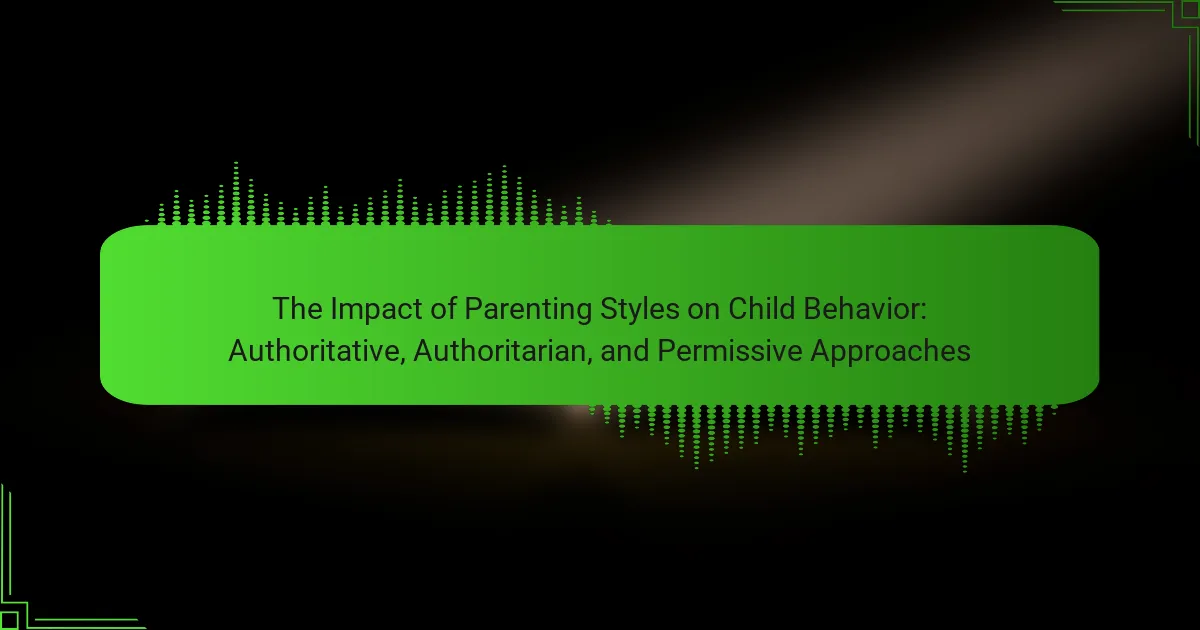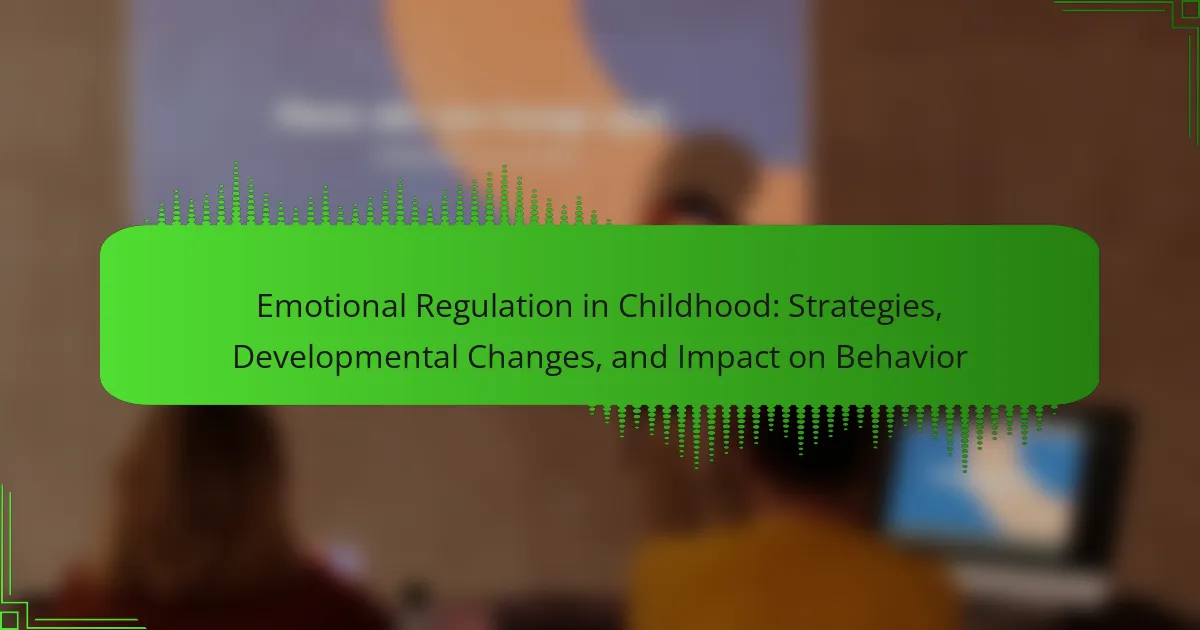Parenting styles are psychological constructs that describe the various approaches parents take in raising their children, significantly impacting child development, behavior, and emotional well-being. The article examines four primary parenting styles: authoritative, authoritarian, permissive, and uninvolved. Authoritative parenting, characterized by high responsiveness and demands, is linked to positive outcomes such as better social skills and academic performance. In contrast, authoritarian parenting, which involves high demands but low responsiveness, often results in lower self-esteem and behavioral issues. Permissive parenting, marked by high responsiveness and low demands, can lead to difficulties with self-discipline and impulse control. Understanding these parenting styles is crucial for parents aiming to make informed decisions that foster healthy child development.

What are Parenting Styles and Their Importance?
Parenting styles are the psychological constructs that describe the general approaches parents use in raising their children. These styles significantly influence child development, behavior, and emotional well-being. There are four primary styles: authoritative, authoritarian, permissive, and uninvolved.
Authoritative parenting is characterized by high responsiveness and high demands. Research shows that children raised by authoritative parents tend to exhibit better social skills and academic performance. Authoritarian parenting involves high demands but low responsiveness, often leading to children who may be obedient but lack self-esteem. Permissive parenting is marked by high responsiveness and low demands, which can result in children struggling with self-discipline.
The importance of understanding these styles lies in their long-term effects on child behavior and personality development. Studies indicate that authoritative parenting is linked to positive outcomes, while authoritarian and permissive styles can lead to various behavioral issues. Understanding these styles helps parents make informed decisions about their parenting approach.
How do different parenting styles influence child behavior?
Different parenting styles significantly influence child behavior. Authoritative parenting fosters independence and self-regulation in children. Research indicates that children raised by authoritative parents exhibit higher self-esteem and better social skills. Authoritarian parenting often leads to obedience but can hinder emotional expression. Studies show these children may struggle with anxiety and low self-esteem. Permissive parenting encourages creativity but may result in poor impulse control. Children from permissive homes often have difficulty adhering to rules and boundaries. Each style shapes behavior through unique interactions and expectations.
What are the key characteristics of authoritative parenting?
Authoritative parenting is characterized by high responsiveness and high demands. Parents set clear expectations and rules while being supportive and nurturing. This style encourages open communication between parents and children. Children are allowed to express their opinions and feelings. Authoritative parents provide guidance and structure but also promote independence. Research shows that children raised with this style tend to have better social skills and academic performance. A study by Baumrind (1966) highlighted that authoritative parenting leads to higher self-esteem in children. Overall, authoritative parenting balances discipline with emotional support.
How does authoritarian parenting differ from authoritative parenting?
Authoritarian parenting is characterized by high demands and low responsiveness. In this style, parents enforce strict rules and expect obedience without question. Authoritative parenting, on the other hand, combines high demands with high responsiveness. Authoritative parents set rules but also encourage open communication and independence. Research shows that children raised by authoritative parents tend to exhibit better social skills and emotional regulation than those raised in authoritarian households. This difference in approach affects children’s behavior and development significantly.
What defines permissive parenting and its approach to discipline?
Permissive parenting is characterized by a high level of responsiveness and low demands. This style emphasizes nurturing and communication rather than strict rules. Parents who adopt this approach often allow children significant freedom. They may avoid setting firm boundaries or enforcing discipline. Consequently, children raised in permissive households may struggle with self-regulation. Research indicates that permissive parenting can lead to behavioral issues. A study by Baumrind in the 1960s identified permissive parenting as one of the primary styles. This research highlighted the lack of structure in discipline associated with this approach.
Why is understanding parenting styles crucial for child development?
Understanding parenting styles is crucial for child development because they significantly influence a child’s emotional and social growth. Different styles, such as authoritative, authoritarian, and permissive, shape a child’s behavior and self-esteem. Research shows that authoritative parenting often leads to the most positive outcomes, including better academic performance and social skills. In contrast, authoritarian styles may result in increased anxiety and lower self-esteem in children. Permissive parenting can lead to difficulties with self-discipline and authority. The way parents interact with their children sets the foundation for their future relationships and coping mechanisms. Hence, recognizing and adapting parenting styles can foster healthier development in children.
How do parenting styles affect a child’s emotional health?
Parenting styles significantly influence a child’s emotional health. Authoritative parenting, characterized by warmth and structure, fosters higher self-esteem and better emotional regulation in children. In contrast, authoritarian parenting, which is strict and unresponsive, can lead to increased anxiety and lower self-worth. Permissive parenting, marked by indulgence and lack of boundaries, often results in difficulties with self-discipline and emotional stability. Research indicates that children raised in authoritative households tend to exhibit better social skills and emotional resilience compared to those from authoritarian or permissive backgrounds. Studies show that authoritative parenting correlates with lower rates of depression and behavioral issues in children, highlighting its positive impact on emotional well-being.
What role do parenting styles play in shaping social skills?
Parenting styles significantly influence the development of social skills in children. Authoritative parenting, characterized by warmth and structure, promotes effective communication and social competence. Children raised in this environment tend to exhibit better emotional regulation and interpersonal skills. Conversely, authoritarian parenting, which emphasizes strict discipline and low warmth, can hinder social skill development. Children from these backgrounds may struggle with social interactions and exhibit higher levels of aggression. Permissive parenting, marked by high warmth but low control, often leads to difficulties in setting boundaries, impacting social behavior negatively. Research by Baumrind (1991) supports these findings, indicating that authoritative parenting is associated with positive social outcomes.
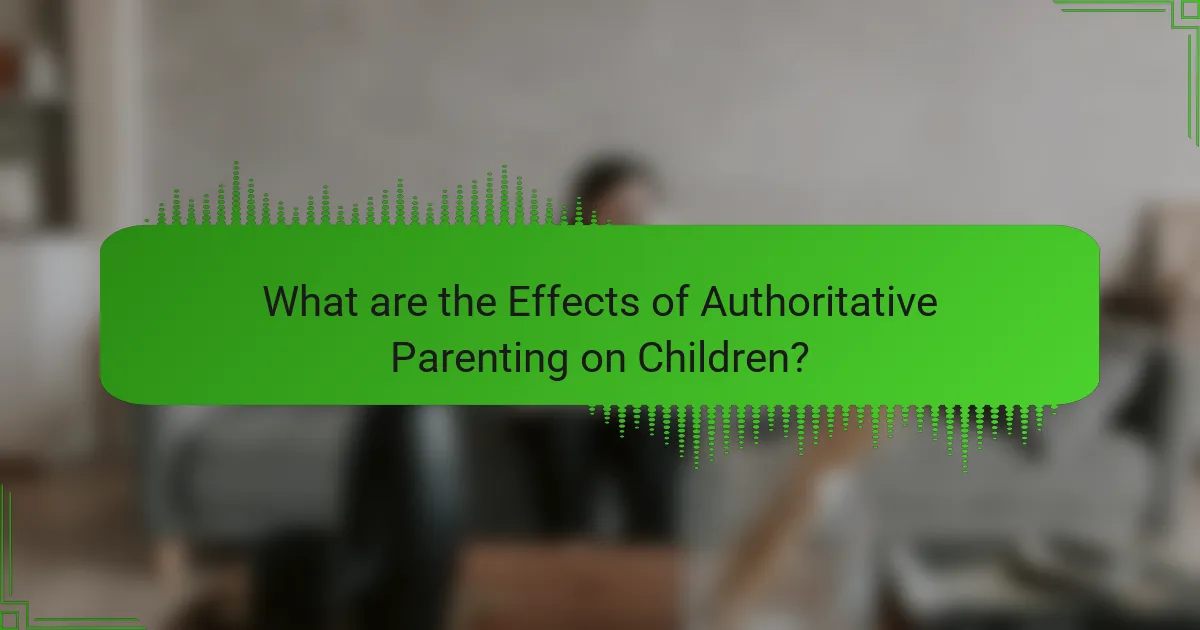
What are the Effects of Authoritative Parenting on Children?
Authoritative parenting positively affects children by promoting their emotional and social development. Children raised in this environment tend to exhibit higher self-esteem. They often demonstrate better academic performance compared to peers from other parenting styles. Authoritative parents balance warmth and structure, fostering independence while providing guidance. Research shows that these children are more likely to develop strong social skills. They also tend to have lower levels of anxiety and depression. A study by Baumrind (1991) highlights that authoritative parenting leads to favorable outcomes in children’s behavior and emotional health. Overall, authoritative parenting contributes significantly to well-adjusted and resilient children.
How does authoritative parenting promote positive behavior in children?
Authoritative parenting promotes positive behavior in children through a balanced approach of support and structure. This style combines warmth with clear expectations. Children raised in authoritative environments tend to exhibit higher self-esteem and better social skills. Research shows that these children are more likely to engage in prosocial behaviors. They understand the reasons behind rules, fostering internal motivation. A study by Baumrind in 1966 found that children of authoritative parents performed better academically. They also displayed lower levels of aggression and behavioral issues. Overall, authoritative parenting cultivates a nurturing atmosphere that encourages positive development.
What are the long-term outcomes associated with authoritative parenting?
Authoritative parenting leads to positive long-term outcomes in children. These children often exhibit higher academic performance. They tend to have better social skills and emotional regulation. Authoritative parenting fosters independence and self-discipline. Research indicates that these children are more likely to develop a strong sense of self-efficacy. They also show lower levels of anxiety and depression. A study by Baumrind (1991) highlights these benefits, showing that children raised with this style are generally more well-adjusted. Additionally, they are more likely to form healthy relationships in adulthood.
How does authoritative parenting foster independence in children?
Authoritative parenting fosters independence in children by promoting autonomy while providing support. This parenting style encourages children to make choices and express their opinions. Parents set clear expectations and boundaries, allowing children to learn consequences. They also offer guidance and feedback, which builds confidence. Studies show that children raised by authoritative parents tend to be more self-reliant. Research indicates that these children develop better problem-solving skills. They are more likely to take initiative in various situations. This balance of freedom and support is crucial for fostering independence.
What challenges might arise with authoritative parenting?
Authoritative parenting can present several challenges. One challenge is balancing responsiveness with high expectations. This balance can create stress for both parents and children. Another challenge is managing children’s independence while maintaining guidance. Children may resist authority, leading to conflicts. Moreover, consistent enforcement of rules can be difficult. Parents may struggle to maintain discipline while being nurturing. Additionally, cultural differences can influence perceptions of authoritative parenting. What works in one culture may not resonate in another. Research indicates that authoritative parenting can lead to higher academic performance but may also result in increased anxiety in children.
How can parents balance authority and warmth in their approach?
Parents can balance authority and warmth by establishing clear expectations while also showing empathy. Setting consistent rules provides structure for children. This structure helps children feel secure and understand boundaries. Simultaneously, expressing affection and understanding fosters a supportive environment. Parents should actively listen to their children’s feelings and concerns. This approach encourages open communication and trust. Research indicates that authoritative parenting, which combines both authority and warmth, leads to better emotional and social outcomes for children. For instance, a study by Baumrind (1966) found that children of authoritative parents tend to exhibit higher self-esteem and better social skills.
What are common misconceptions about authoritative parenting?
Common misconceptions about authoritative parenting include the belief that it is overly strict. In reality, authoritative parenting balances high expectations with warmth and support. Another misconception is that it leads to rebellious children. Research shows that children raised with this style tend to be more responsible and self-reliant. Some think authoritative parents do not enforce rules. However, they set clear guidelines while encouraging independence. Lastly, many believe it is the same as permissive parenting. Unlike permissive parents, authoritative parents maintain structure and discipline.
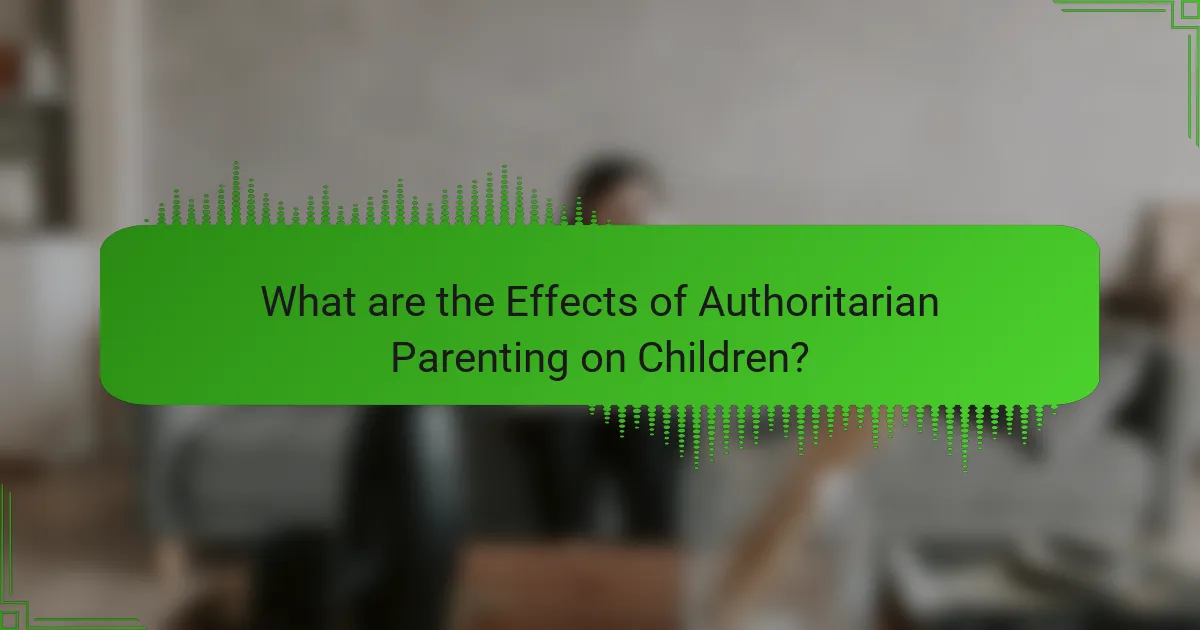
What are the Effects of Authoritarian Parenting on Children?
Authoritarian parenting negatively impacts children’s emotional and social development. Children raised in authoritarian environments often exhibit lower self-esteem. They may struggle with anxiety and depression due to high parental expectations and lack of warmth. These children tend to have poor social skills. They often face difficulties in forming healthy relationships. Research indicates that authoritarian parenting can lead to behavioral issues. A study by Baumrind (1966) highlighted that such children are more likely to be rebellious or aggressive. Overall, the effects of authoritarian parenting can hinder a child’s overall well-being and development.
How does authoritarian parenting impact a child’s self-esteem?
Authoritarian parenting negatively impacts a child’s self-esteem. This parenting style is characterized by high demands and low responsiveness. Children raised in such environments often feel less competent. They may internalize feelings of inadequacy due to strict rules and little emotional support. Research indicates that these children are more likely to experience anxiety and depression. A study by Baumrind (1991) found that authoritarian parenting leads to lower self-esteem in children. These children may struggle with social interactions and have difficulty asserting themselves. Overall, authoritarian parenting creates an environment that undermines a child’s confidence and self-worth.
What behavioral issues are often seen in children raised with authoritarian parenting?
Children raised with authoritarian parenting often exhibit behavioral issues such as increased aggression and defiance. They may struggle with low self-esteem and anxiety. Authoritarian parenting can lead to difficulties in social interactions. These children might also display poor academic performance and lack of motivation. Research shows that they are more likely to experience depression. A study published in the Journal of Family Psychology found that authoritarian parenting correlates with higher levels of behavioral problems. This indicates that the strict control and lack of warmth can negatively impact a child’s emotional and social development.
How does authoritarian parenting affect parent-child relationships?
Authoritarian parenting negatively affects parent-child relationships by fostering resentment and communication barriers. Children raised in this style often experience high levels of stress and anxiety. They may feel a lack of autonomy and struggle with self-esteem. Research indicates that these children are less likely to express their thoughts and feelings openly. Authoritarian parents enforce strict rules with little room for discussion. This limits the development of a trusting relationship. Studies show that such dynamics can lead to rebellion in adolescence. Overall, authoritarian parenting creates an environment where emotional connection is compromised.
What are the potential benefits of authoritarian parenting?
Authoritarian parenting can lead to certain benefits for children. This style often instills discipline and structure. Children raised in authoritarian environments may develop strong obedience and respect for authority. Research indicates that such children may perform better academically due to clear expectations. A study published in the Journal of Family Psychology found that children from authoritarian families often exhibit higher levels of self-control. They may also have a clear understanding of boundaries, which can enhance safety. Additionally, these children might develop resilience in facing challenges. Overall, the structured environment can contribute positively to certain behavioral outcomes.
In what situations might authoritarian parenting be effective?
Authoritarian parenting may be effective in situations requiring immediate compliance and structure. This style can instill discipline in children who thrive under clear rules. It may be beneficial in high-risk environments where safety and adherence to rules are paramount. Research indicates that children in structured settings, such as military families, often respond well to authoritarian approaches. Studies show that in cultures emphasizing obedience, authoritarian parenting can lead to respect for authority and social order. However, it is essential to apply this style judiciously to avoid negative emotional outcomes.
How can parents mitigate negative outcomes associated with authoritarian practices?
Parents can mitigate negative outcomes associated with authoritarian practices by adopting a more balanced approach. They should incorporate open communication with their children. This allows children to express their feelings and thoughts. Encouraging independence helps children develop decision-making skills. Providing warmth and support fosters a secure emotional environment. Setting clear and reasonable expectations can replace harsh discipline. Engaging in positive reinforcement promotes desirable behaviors. Research indicates that supportive parenting reduces anxiety and improves social skills in children. Studies show that children from authoritative homes tend to have better emotional regulation compared to those raised in authoritarian environments.
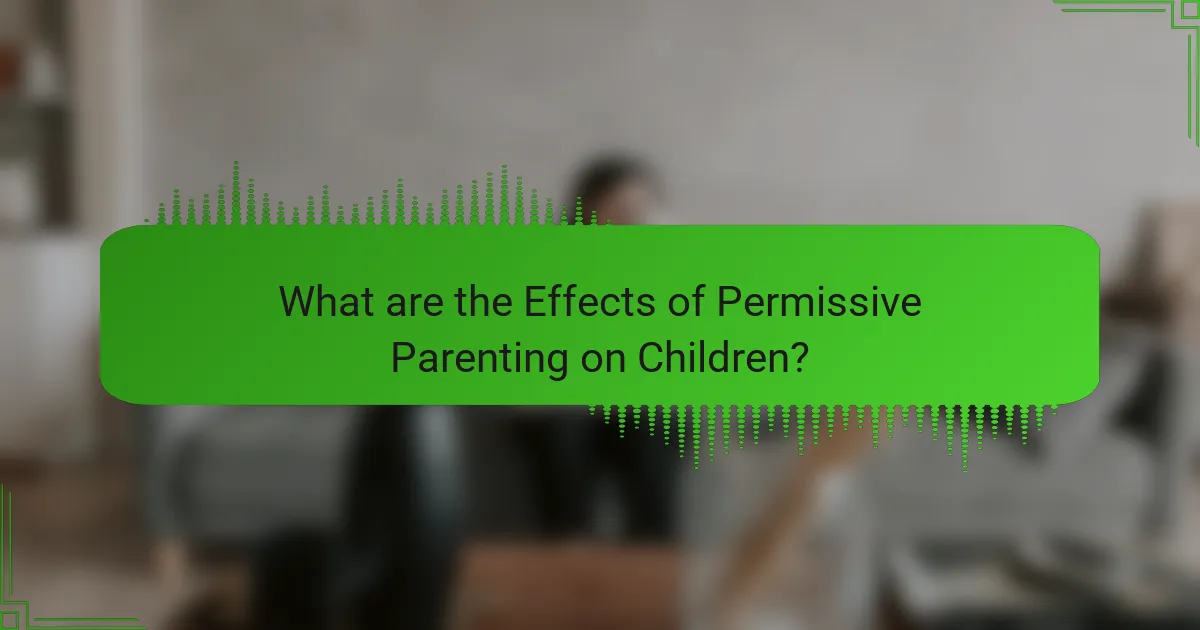
What are the Effects of Permissive Parenting on Children?
Permissive parenting leads to children exhibiting lower self-discipline. These children often struggle with impulse control. They may also show higher levels of anxiety and depression. Research indicates that permissive parenting is linked to behavioral issues. A study by Baumrind (1991) found that children of permissive parents tend to have difficulties in school settings. Additionally, they may have trouble with authority figures. This parenting style often results in children lacking boundaries. Consequently, they may face challenges in social interactions and relationships.
How does permissive parenting influence a child’s behavior and decision-making?
Permissive parenting leads to children exhibiting higher levels of impulsivity and lower self-regulation. This parenting style is characterized by a lack of enforced rules and expectations. As a result, children may struggle with decision-making and face difficulties in understanding consequences. Research indicates that permissive parents often prioritize warmth and acceptance over discipline. Consequently, children may develop a sense of entitlement and struggle with authority figures. Studies show that these children may also perform poorly academically due to a lack of structure. Overall, permissive parenting significantly impacts a child’s behavior and decision-making abilities.
What are the common traits of children raised with permissive parenting?
Children raised with permissive parenting often exhibit traits such as high self-esteem and low self-discipline. They tend to be more creative and socially adept. However, they may struggle with authority and exhibit impulsive behavior. Research indicates that these children often have difficulty with limits and rules. They may also show higher levels of anxiety and lower academic performance. These traits stem from the lack of structure and guidance in their upbringing. Studies have shown that permissive parenting can lead to challenges in emotional regulation. Overall, these common traits reflect the influence of a permissive parenting style on child development.
How does permissive parenting affect academic performance?
Permissive parenting negatively affects academic performance. Children raised in permissive households often lack structure and discipline. This can lead to lower motivation and poor study habits. Research indicates that these children may struggle with time management. A study by Baumrind (1991) found that permissive parenting correlates with lower academic achievement. This style often results in reduced parental involvement in education. Consequently, children may not prioritize their schoolwork. Overall, permissive parenting can hinder a child’s academic success.
What are the risks associated with permissive parenting?
Permissive parenting carries several risks that can negatively impact child development. Children raised in permissive environments often struggle with self-discipline. They may exhibit poor impulse control and difficulty managing their emotions. Research indicates that these children are more likely to engage in risky behaviors, such as substance abuse. A study published in the Journal of Child Psychology and Psychiatry found that permissive parenting correlates with higher rates of behavioral problems. Additionally, children may lack respect for authority figures and struggle with following rules. This parenting style can lead to academic challenges due to a lack of structure. Overall, permissive parenting can hinder a child’s ability to thrive in various aspects of life.
How can permissive parenting lead to difficulties with authority figures?
Permissive parenting can lead to difficulties with authority figures due to a lack of boundaries and discipline. Children raised in permissive environments often do not learn to respect rules or authority. This can result in challenges when they encounter figures such as teachers or law enforcement. Research indicates that permissive parenting may foster entitlement and resistance to authority. A study published in the Journal of Child Psychology found that children with permissive parents exhibited higher levels of defiance towards authority figures. Consequently, these children may struggle to adapt to structured environments, impacting their social interactions and academic performance.
What strategies can parents use to create balance in permissive parenting?
Parents can create balance in permissive parenting by setting clear boundaries. Establishing consistent rules helps children understand expectations. Parents should also engage in open communication. Discussing feelings and choices fosters understanding. Implementing consequences for behavior reinforces accountability. This teaches children the impact of their actions. Parents can model self-discipline through their own behavior. Demonstrating balanced decision-making shows children how to navigate choices. Additionally, incorporating structure into daily routines provides stability. Research indicates that children thrive in environments with both freedom and limits.
What are the best practices for parents to consider across different styles?
Best practices for parents across different styles include being consistent in discipline and expectations. Establishing clear rules helps children understand boundaries. Active listening fosters open communication between parents and children. Encouraging independence allows children to develop decision-making skills. Providing emotional support builds a child’s self-esteem. Setting realistic expectations helps children achieve their potential without undue pressure. Engaging in family activities strengthens relationships and promotes bonding. Research shows that positive parenting practices lead to better behavioral outcomes in children.
The main entity of this article is parenting styles, specifically focusing on authoritative, authoritarian, and permissive approaches. The article examines how these distinct styles influence child behavior, emotional health, and social skills. It highlights the characteristics of each parenting style, their long-term effects on children, and the importance of understanding these dynamics for optimal child development. Key findings indicate that authoritative parenting promotes positive outcomes, while authoritarian and permissive styles can lead to various behavioral and emotional challenges. The article also discusses strategies for parents to balance their approaches effectively.
